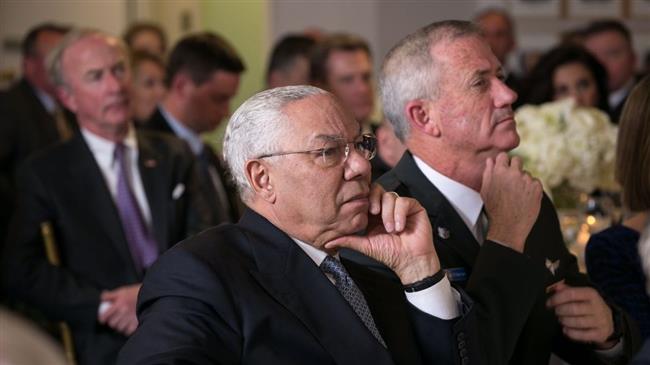[caption id="attachment_143746" align="alignright" width="177"] Former US Secretary of State and chairman of the Joint Chiefs of Staff General Colin Powell (C), and the chief of staff of the Israeli military, Lieutenant General Benny Gantz (R), at the Israeli embassy in Washington, January 7, 2015[/caption]
Former US Secretary of State and chairman of the Joint Chiefs of Staff General Colin Powell (C), and the chief of staff of the Israeli military, Lieutenant General Benny Gantz (R), at the Israeli embassy in Washington, January 7, 2015[/caption]
A top Israeli military official has warned the United States against making “concessions” to Iran in the course of the negotiations with the Islamic Republic over its nuclear energy program.
“It is not time for concessions for them (the Iranians),” the outgoing chief of general staff of the Israeli military, Lieutenant General Benny Gantz, said on Wednesday.
He made the remarks in an address to a group of US Congressmen and defense strategists, including General Colin Powell, who is a former US secretary of state and chairman of joint chiefs of staff, Senator Lindsey Graham and Israeli Ambassador to the US Ron Dermer, at the Israeli embassy in Washington.
The Israeli official claimed that the Tel Aviv regime prefers a diplomatic solution to the West’s dispute over Iran’s nuclear energy program. He said that the failure of the talks between Tehran and the six world powers “will lead to war.”
Angered by a historic interim deal reached in November 2013 between Iran and its negotiating partners, the Israeli regime has been lobbying over the past months to thwart a final accord.
Tel Aviv has accused Iran of pursuing non-civilian objectives in its nuclear activities. However, Tehran has categorically denied the allegation, vowing that it will not back down an iota from its peaceful nuclear rights and will not buckle under any pressure.
Iran and the five permanent members of the UN Security Council – Russia, China, France, Britain and the US – plus Germany wrapped up their latest round of talks on the Islamic Republic’s nuclear program in the Swiss city of Geneva on December 17, 2014.
The three-day Geneva discussions were held almost three weeks after Tehran and the six countries failed to reach a final agreement by a November 24 deadline despite making some progress. Back then, the two sides agreed to extend their discussions for seven more months until July 1, 2015. They also agreed that the interim deal they had signed in Geneva in November 2013 should remain in place during the negotiations.
By Press TV
The Iran Project is not responsible for the content of quoted articles.

 QR code
QR code